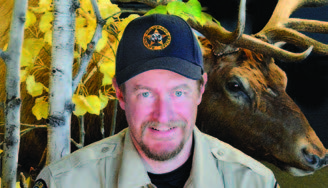
Editor’s Note: This is a regular monthly column from Colorado Parks and Wildlife about wildlife issues in the Falcon area by a career wildlife officer.
Aaron Berscheid is a district wildlife officer for Colorado Parks and Wildlife. Aaron covers the “wild” side of Northeast El Paso County, including Black Forest, Falcon, Peyton and Calhan. He also covers some of Elbert County, north of U.S. Highway 24 and south of State Highway 86, including the towns of Elbert, Kiowa, Ramah, Simla, Matheson and a small portion of the Limon area.
Most interesting jobs in the state: wildlife officers and park rangers
By Aaron Berscheid
District Wildlife Manager, CPW
Today, I thought I’d give you some insight into my job as a wildlife officer for Colorado Parks and Wildlife, as I prepare for my busy time of year: hunting season.
Understandably, many think enforcing Colorado hunting laws are the only thing I do.
It’s true that checking hunters and following leads on poaching investigations are major responsibilities of mine. But you might be surprised to know all the other duties of CPW wildlife officers — formally known as District Wildlife Officers.
First, let me start by addressing the common confusion about CPW wildlife officers and park rangers. Both play important, and very separate, law enforcement roles in CPW.
I work closely with the rangers at Cheyenne Mountain State Park and Mueller State Park. But I am not a park ranger. And they are not wildlife officers.
Rangers are law enforcement professionals who work hard to provide visitors to their parks an amazing opportunity to enjoy the outdoors, and to keep their visitors safe.
They are dedicated to providing new opportunities for their visitors, as well with interpretive programs about their parks and the wildlife within. At busy urban parks, they sometimes face unruly groups, domestic disturbances in campgrounds and tragedies such as drownings. It’s an important and tough job.
My job is much different, starting with all the various titles people call my fellow CPW wildlife officers and me. To some, we are “game wardens,” or “conservation officers,” or “wildlife officers.” Those are actual titles in other states. But they don’t accurately describe what a Colorado District Wildlife Manager does.
In other states, game wardens are strictly law enforcement officers. They only enforce the laws of the state relating to wildlife and the other laws of the state that they work in.
District Wildlife Officers, known as DWMs, in Colorado are law enforcement officers, too. Make no mistake, I am a certified peace officer in the state and have statewide jurisdiction to enforce any law within the state, focusing mostly on laws related to wildlife and wildlife management.
The biggest difference between DWMs in Colorado and game wardens in other states is that law enforcement is only about a third of my job duties. And every DWM and park ranger in Colorado must have a college degree in some aspect of biology.
That requirement was imposed some 60 years ago to ensure DWMs would be qualified for all the other aspects of our jobs: public service and public education involving wildlife as well as day-to-day management of wildlife species in my district.
For example, I work closely with landowners, schools and citizens who have questions and issues with wildlife. This includes providing school programs for any grade to educate future generations about wildlife and wildlife management.
This also includes meeting with people who are having issues with wildlife and need a little help coexisting with wildlife. Writing these columns every month is part of my education efforts. I will always be an advocate for wildlife and these types of job duties help me with that goal.
My wildlife management duties involve conducting aerial wildlife surveys from a plane each year to count pronghorn, or in helicopters to count deer and elk. I also work closely with our terrestrial and aquatic biologists to manage and maintain healthy populations through hunting license distributions and staying in tune with the health of the fisheries in my district.
Different times of the year call for different hats to be worn, but I wouldn’t have it any other way. I think that my job is probably one of the most diverse jobs you could find in Colorado. This provides challenges that require a lot of critical thinking and dedication to provide the citizens of Colorado with wildlife populations that will be sustained for many generations to come.
This leads me to my final point in this article. Colorado Parks and Wildlife, at the time that I am writing this article, is hiring next year’s class of district wildlife managers and park rangers.
The deadline for applying was Sept. 30, but we are constantly recruiting new DWMs and rangers. If you have any interest in being a DWM or park ranger, I am always happy to provide more information about the job and how to become a successful district wildlife manager or park ranger. We even take interested candidates on ride-alongs so they can see what we do on a daily basis.
So, if you are interested in these jobs as a future profession, please get in touch with me!
I will include the links below on how to apply, in case this comes out before the deadline.
District Wildlife Manager Trainee: https://www.governmentjobs.com/careers/colorado/jobs/4628415/cpw-district-wildlife-manager-trainee
Park Ranger Trainee:
https://www.governmentjobs.com/careers/colorado/jobs/4628425/cpw-park-ranger-trainee
I take pride in helping the future trainees become the next generation of proud professionals in the wildlife field. I have been a field training officer for 12 years, and am willing to give anyone a hand in building their resume for the job.
In the coming months, I’ll share more stories as I write about wildlife issues in our community. Got a question, problem or column idea? Please email me at aaron.berscheid@state.co.us or call me at 719-227-5231.
I might even answer your question in a future installment of “Wildlife Matters.”



